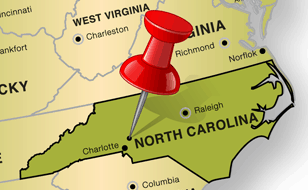 North Carolina State Law
North Carolina State Law
North Carolina has two sets of procedures that you must attend to when you have been charged with an OWI—administrative and judicial. We suggest that you consult with a DWI attorney immediately to make sure you get the best advice for your particular situation as laws are always changing.
Administrative License Revocation (ALR) Procedures
North Carolina DMV (Department of Motor Vehicles)
North Carolina is one of 42 states that has implemented ALR which means that your license will be confiscated immediately if your BAC is above .08 OR if you refuse a BAC test. Your license will either be suspended or revoked at that point, even though you have not been officially convicted in a criminal trial. In fact, you can be charged with an administrative license suspension even if you are not later charged with driving under the influence offense. This action was designed to be in addition to and separate from the traditional DWI judicial conviction penalties such as license suspension, jail time, community service hours, ignition interlock device (IID), and alcohol and drug rehabilitation.
You will be given a 30 day grace period during which you can drive under a temporary driving permit issued by the officer at the scene. During that time, you can request a hearing to challenge this case. This case will be heard by an administrative law judge. If you do not request a hearing, your license will be automatically remain suspended for a month. After the suspension period, you will have a restricted license allowing you to drive to work or school, health care providers, parole or probation meetings, drug, and alcohol counseling, court-approved locations, and emergencies. North Carolina allows you to install an interlock device in lieu of suspension after 10 days.
Remember that this is a separate case from the judicial case, with separate authorities and separate rulings. This can be a very important influence upon the judicial procedures, but you must act very quickly if you wish to challenge this.
Judicial Procedures
In North Carolina, the drunk driving law prohibits a person from driving when they have a BAC of .08% or higher. Courts are required to order the installation and monitoring of an interlock device for any driver whose BAC levels are .15% or higher, even for a first offense.
License Revocation, Fines and Jail
- First Offense – Misdemeanor: 1 day to 2 years in jail, 1-day community service, $200 to $4,000 in fines, 1-year driver’s license suspension, potential vehicle impound or confiscation, and substance abuse assessment and treatment. If BAC is 0.15 or more then ignition interlock restriction will be required for a period of 1 year upon license restoration.
- Second Offense – Misdemeanor: 7 days to 2 years in jail, $2,000 to $4,000 in fees, 1 to 4 years driver’s license suspension, substance abuse assessment, and treatment, 3-year ignition interlock restriction upon license restoration following a 4-year revocation.
- Third Offense – Class F Felony: 7 days to 2 years in jail, $2,000 to $4,000 in fees, permanent driver license suspension (if within 5 years of last offense), potential vehicle impound or confiscation, substance abuse assessment and treatment, 7-year ignition interlock restriction upon license restoration (if restoration eventually allowed).
- Fourth Offense – Class F Felony: 1 to 5 years in jail, permanent license revocation (no conditional license for at least 10 years), substance abuse and treatment, potential vehicle impound or confiscation, 7-year ignition interlock restriction upon license restoration (if restoration eventually allowed).
Aggravating and Mitigating Factors
The above penalties can be significantly altered based on the existence of aggravating or mitigating factors. Sentencing guidelines in North Carolina are based on both the number of prior convictions and any aggravating or mitigating factors (identified below) that exist. The judge must base the sentencing on the presence of any of these factors.
- Grossly Aggravating Factors: prior DUI/DWI conviction within seven years; DUI/DWI while license is suspended for a previous DUI/DWI; serious injury to another in the car; children under 16 in the car.
- Aggravating Factors: BAC of .15 or higher, reckless driving, prior convictions, revoked license.
- Mitigating Factors: safe driving record; BAC of .09 or lower; the presence of drugs; voluntary submission to treatment; unavailability of test with slight impairment.
Get started now. Call 1-800-521-4246 for more information on North Carolina ignition interlock installation.